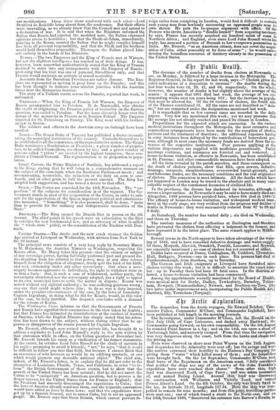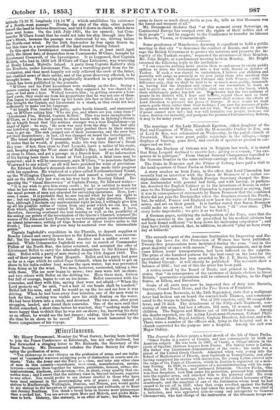3trtir Ccritnrotton.
The despatches from the Arctic voyagers, Sir Edward Belcher Com- mander Pullen, Commander M'Clure, and Commander Inglefield, hare been published at full length in the morning journals.
The Investigator, -under Commander M'Clure, left the Herald on the 31st July 1850, of Cape Lisbourne, and dashed away Eastward; the Commander going forward, on his own responsibility. On the 5th August he rounded Point Barrow in a fog; and on the 14th, ran upon a shoal off Yarborough Inlet, and narrowly escaped. From that time the navigation was very dangerous along the coast, both from the banks and shoals end the driving ice. Huts were observed on shore near Point Warren on the 24th August, and despatches for the Admiralty were sent off; but the savage and war- like natives expressed their hostility to the Hudson's Bay Company; for giving them "water" which 'killed many of them ; and the despatches were brought back. On the 1st September, Commander M'Clure took final leave of the Esquimaux on the American coast, " fully canyipeed that neither the ships nor any of the urewa of Sir eTohn Franklin's expedition have ever reached their shores." Soon •triter thisi•Aigh land was discovered North of Cape Parry ; and seas taken posies:eon of, and named Baring Island. Around this, • lend was discovered in continuation with Wollaston and Victoria Land, and named Prince Albert's Land. On the 8th October, the ship was firmly fixed in the ice, in latitude 72.47, longitude 117.34. Here the ship was Com- pelled to remain for nine months; and from this point travelling-parties were sent out ; one of which traced a strait to the North-east, and on the 26th` October 1850, "discovered the entrance into Barrow's Straits, in latitude 73.30 N. longitude 114.14 W. ; which establishes the existence of a North-weft passage." During the stay of the ship, other parties traced the land in various directions, and laid it down in oharta, which have been sent home. On the 14th July 1851, the ice opened; but Com- mander M'Clure found that he could not take his ship through into Bar- row's Strait, because the passage was obstructed by ice, driving before the North-east wind. By the 24th September he was again frozen in, but this time in a new position off the land named Baring Island. In this spot the Investigator remained frozen in, at least until April 1853, the latest date of despatches from Commander M'Clure, brought by Lieutenant Creaswell, of the Investigator. It so happened, thaeCaptain Kellett, who had in 1850 left M'Clure off Cape Lisbourne, was wintering at Healy Island, Melville Island. A party from Captain Kellett's ship the Resolute, under Lieutenant Pim, met a travelling-party from the In- vestigator, and thus moat happily not only relieved the crew of the latter, but enabled news of their safety, and of the great discovery effected, to be brought home. The meeting is graphically described in a private letter, which has been published in the journals. 4.31'Clure and his First Lieutenant were walking on the floe. Seeing a person coming very fast towards them, they supposed he was chased by a bear, or had seen a bear. Walked towards him; on getting onwards a hun- dred yards, they could see from his proportions that he was not one of them. Pim began to screech and throw up his hands (his face as black as my hat) ; this brought the Captain and Lieutenant to a stand, as they could not hear sufficiently to make out his language.
"At length Pim reached the party, quite beside himself, and stammered out, on M'Clure asking him Who are you, and where are you come from ? ' 'Lieutenant Pim, Herald, Captain Kellett.' This was more inexplicable to M'Clure, as I was the last person he shook hands with in Behring's Straits. He at length found that this solitary stranger was a true Englishman—an angel of light : he says, ' He soon was seen from the ship : they had only one hatchway open, and the crew wero fairly jambed there in their endea- vour to get up. The sick jumped out of their hammocks, and the crew for- got their despondency ; in fact, all was changed on board the Investigator.'" The latest despatch of Commander M'Clure is dated April 10, 1853. It states that he would, if possible, make his way into Barrow's Strait this year : if not, then cross to Port Leopold, leave a notice of his route, and, keeping along the West shore of Baffin's Bay, look out for whalers, or cross to Disco, and get a passage in a Danish boat. If no information of his having been there is found at Port Leopold, a fatal issue may be surmised; and it will be unnecessary, says M'Clure, "to penetrate further Westward to our relief," as all will have perished for want of provisions. Sir Edward Belchees despatch shows that he has made little progress with his squadron. He wintered at a place called Northumberland Sound, up the Wellington Channel, discovered and named a variety of places, and on the 26th July last was on his way back to Beechey Island. Re- specting the "visual discoveries" of Captain Penny, Sir Edward writes-
" It is my wish to give him every credit ; for he is entitled to much for what he has done. He has evinced a masterly and vigorous intellect beyond the usual powers of men not educated for surveying operations. Here, how- ever, I cease. It is probable that he saw beyond what he had any right to see ; but our longitudes, &c. will evince, not in the right direction. There- fore, although I disclaim any mathematical right he has, I willingly give him up all his possible radius of vision from any point which we can see, and from which, although never visited by him, we might be seen. I have, therefore, throwing overboard the true bearing as well as the possibility of his seeing our points of the termination of the Queen's Channel, retained the names of Sir John and Lady Franklin as our turning-points (notwithstanding an island intervenes, outting off Cape Beecher at about twelve miles to the South.) The names he has given may be scattered over the intermediate points." 'Captain Inglefield's expedition in the Phcenix, to deposit supplies at Beechy Island and carry despatches to Sir Edward Belcher, was success- ful; but the transport-ship was lost. Another and a sadder event oc- curred. While Commander Inglefield was out in search of Commander Pullen of the North Star, the latter returned, and accepted the offer of Lieutenant Bellot to carry the Admiralty despatches to Sir Edward Bel- cher. Hellot with a party of men started on the 12th August 1853. The end of their journey was Point Hogarth. Bellot and his party had gone as far as a cape which he called Cape Grinnell, when he wished to get on shore in his india-rubber boat across the open water, but was prevented from doing so by the wind. Two men, however, succeeded, taking a line with them. The ice now began to move; two men were left in-shore, and two others with Ballot on the drifting ice. Here these men, forlorn but full of courage, began to cut an ice-house. Bellot conversed with his comrades, and they with him, saying they were not afraid—" When the Lord protects us," he said, "not a hair of our heads shall be touched." Bellot left his men, and said he would go up the ice and see how it was driving. When he had been away four minutes, one of the men went to look forlim ; nothing was visible save his stick floating on the water. He bad been blown into a crack, and drowned. The two men, after great struggles, landed, and found their comrades. One of the men said that Ballot remarked, a short time before he was lost, that "nothing made him more happy than to think that he was not on shore ; for, knowing his duty as an officer, he would see the last danger ; adding, that he would rather die than be on shore to be saved." Ballot was much lamented by the brave companions of his voyage.



























 Previous page
Previous page